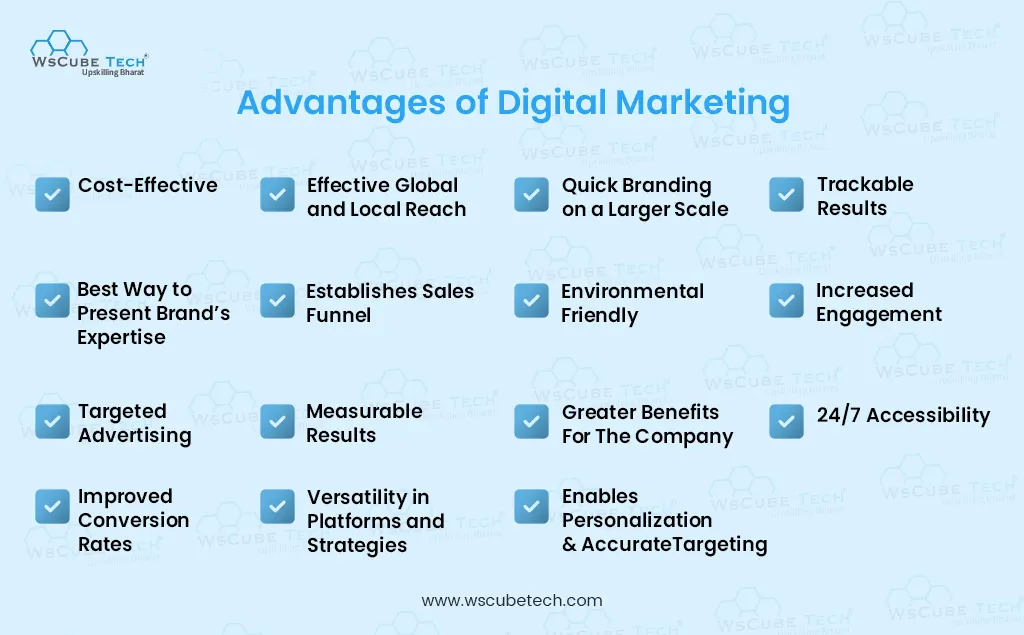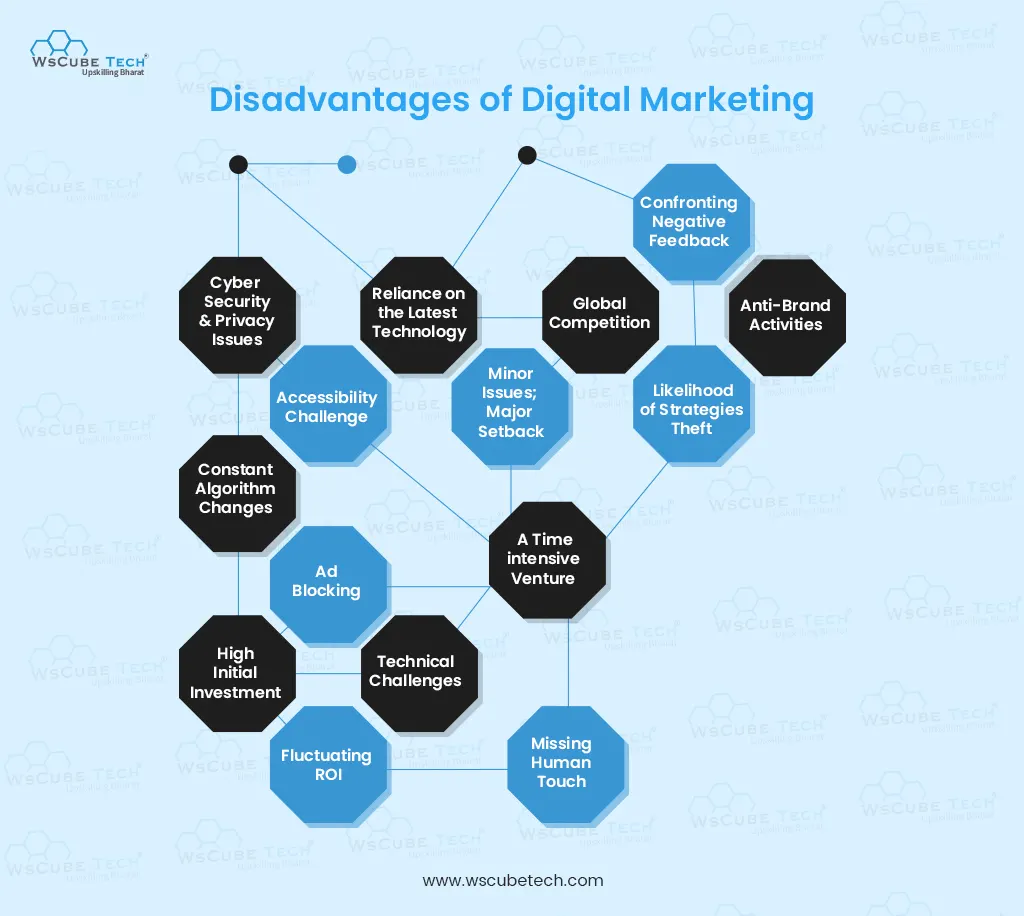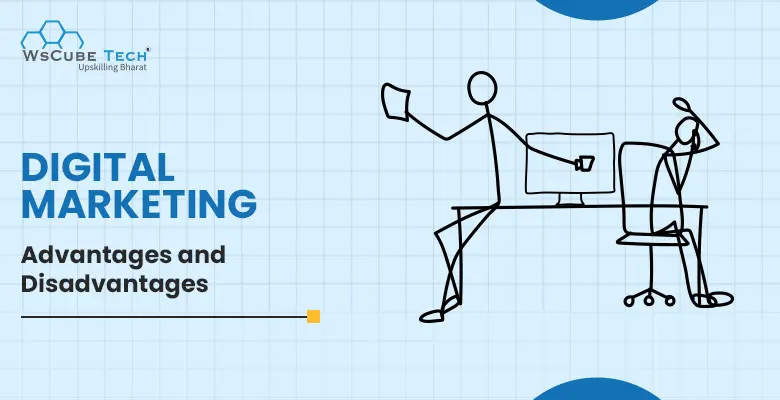The world is changing, and it’s not just about billboards or TV ads anymore. This is the era of the buzzing world of digital marketing.
Internet – the mysterious place where you can watch funny cat videos and decide which shoes to buy for your dinner party. In this diverse world, businesses have found a new playground: Digital Marketing! But is it all rainbows and unicorns? No, it’s not.
Digital marketing offers many advantages to help businesses grow, engage with their customers, and stay ahead of the competition. It provides numerous benefits, but like any strategy, it also comes with its own set of challenges and disadvantages.
Before diving into the advantages and disadvantages of digital marketing, let’s brush up on the idea of digital marketing and find out its types.

What is Digital Marketing?
In a world of screens, digital marketing shines. It’s the art of connecting, captivating, and converting virtual passersby into loyal customers.
Imagine the Internet as a bustling city; digital marketing is its billboard, whisper, and
handshake. Essentially, it promotes products, services, and brands using online channels. The prospects? Limitless. As technology evolves, so do the playgrounds for marketers. Opportunities vary, from social media to emails, videos, and virtual realities.
Digital marketing or online marketing promotes products or services through digital channels, like mobile apps, social media, Internet, and email, to reach and engage with audiences. You can become master in this field with an online digital marketing course.
Some examples of digital marketing include:
1. Search Engine Optimization (SEO)
This involves optimizing a website’s content and structure to upgrade its visibility and ranking in search engine results pages.
2. Pay-Per-Click (PPC) Advertising
This involves placing advertisements on social media platforms or search engines and paying a fee each time someone clicks on the ad.
3. Social Media Marketing
This involves the usage of Twitter, Facebook, Instagram, the social media platforms to promote products or services and engage with customers.
4. Email Marketing
This involves sending marketing messages or promotional offers to a list of email subscribers.
5. Content Marketing
This involves creating and sharing relevant, valuable, consistent content, such as videos, blog posts, and articles, to captivate and retain a clearly defined audience.
These are some examples of digital marketing, but businesses can use many other tactics and strategies to reach and engage with customers online.
Upskill Yourself With Live Training (Book Free Class)
Why is Digital Marketing Important?
With digital marketing, brands reach their target audience and promote their product or service. Although that’s the goal of a traditional marketing campaign, digital marketing helps brands target a more specific or niche audience.
Connecting with customers digitally helps build a larger audience that trusts your brand. It is advantageous for small businesses, which can easily leverage digital marketing tactics without the help of a marketing department or agency.
Also Read: How to Become Freelance Digital Marketer & Get Projects?
Advantages of Digital Marketing

Digital marketing is thriving over traditional marketing nowadays. Whether a new business owner or a veteran is trying to establish his branding ideas, digital marketing goes all the way. Here are some merits of digital marketing:
1. Cost-Effective
- Digital advertising mediums, such as PPC, SEO, etc., are relatively cheaper than conventional ones.
- Digital marketing is the most reasonable and fastest way to market brand products.
2. Effective Global and Local Reach
- Reaches the target audience locally and globally, unlike traditional methods that can be restrictive.
- Helps with local visibility, especially when the market depends on the local reputation.
3. Quick Branding on a Larger Scale
- Directing personalized campaigns on websites that the audience visits most helps build a worldwide brand.
- Provides several approaches for a brand to become more trustable, reliable, and favorable.
4. Best Way to Present Brand’s Expertise
- Enables multiple strategies to convey the same message, i.e., making a brand stand out.
- Allows digital marketers to represent a brand’s expertise via images, videos, texts, and anything in the line of content.
5. Establishes Sales Funnel
- Sets up an online sales funnel that traces the target audience’s journey from online visitors to regular customers.
- Helps suitably modify users’ sales experience and individual branding campaigns for better probability and favorable outcomes.
6. Enables Personalization and Accurate Targeting
- Pays more attention to individual user experience. For instance, the latest AI helps immediately resolve basic to advanced queries.
- Helps a business set clear consumer targets depending on gender, age, occupation, hobbies, interests, or other criteria.
7. Trackable Results
- Firms can analyze the efficacy of marketing strategies and voluntarily work on necessary changes.
- Also, they use digital marketing reports, the official documentation of marketing channel results after a specific duration.
8. Greater Benefits For The Company
- As the Internet is the most preferential place for turning leads into customers, companies benefit greatly by implementing such strategies to fetch a better return on investment than traditional methods.
Also Read: 20 Best AI Tools for Digital Marketing (Free & Paid Tools 2025)
9. Increased Engagement
- Digital marketing encourages 2-way communication. You can engage with the users through social media, comments, and direct messages, building relationships and fostering customer loyalty.
10. Targeted Advertising
- Digital marketing enables precise targeting. You can tailor the campaigns to reach specific demographics, interests, or behaviors, ensuring your message reaches the right people at the right time.
11. Measurable Results
- Unlike traditional marketing, digital marketing provides detailed analytics and metrics. You can track the campaigns’ performance in real-time, allowing you to make data-driven decisions and optimize your strategies for better results.
12. Improved Conversion Rates
- With targeted marketing and personalized content, digital marketing often leads to higher conversion rates. You increase the chances of turning leads into clients by reaching the appropriate audience with the right message.

13. 24/7 Accessibility
- Your online presence is available 24/7. Potential customers can access your website, social media, or other digital platforms anytime, providing a consistent and accessible point of contact.
14. Versatility in Platforms and Strategies
- Instagram, Facebook, email, podcasts – it’s like a buffet of options. Every business, no matter what niche, can find its place. Selling handmade crafts? There’s Etsy. Got a thing for videos? There’s YouTube. There’s a fit for everyone and multiple strategies to play around with.
15. Environmental Friendly
- Think of all the paper saved! A significant digital marketing advantage is its eco-friendly nature. No print materials, no physical waste. It’s marketing that’s kind to your wallet and the planet.
Interview Questions for You to Prepare for Jobs
| Digital Marketing Interview Questions | SEO Interview Questions |
| Email Marketing Interview Questions | Content Writing Interview Questions |
Disadvantages of Digital Marketing

Here comes the drawbacks. We have listed some demerits of digital marketing before you think about shifting from the traditional one:
1. Cyber Security and Privacy Issues
- Cybercrime is one of the major setbacks to advancement in technology. Businesses must implement safe marketing operations independent of hacking.
- The most basic way of hacking is through email, mostly emails void of encrypting to avoid breaches.
2. Accessibility Challenge
- Though digital marketing methods provide global and local reach, some still lack Internet access.
- Roughly some percentage of the world’s population uses the Internet, so the rest of the world can be targeted through traditional marketing.
3. Reliance on the Latest Technology
- Utilizing the current devices and software can be a huge investment and not feasible for small businesses.
- Companies using the latest features can miss an unaware customer base or must be better versed in the latest technologies. For instance, businesses that use mobile applications cannot reach people with no smartphones.
4. Minor Issues; Major Setback
- The audience will likely go to the competitors if a company’s site experiences slow page loading, poor user interface, and other technical setbacks. Therefore, brand choice shifts rapidly among consumers and on a large scale.
5. Global Competition
- Availing global reach via digital marketing brings challenges, like international competition.
- Companies failing to stand out or attract substantial attention disappear from the competition. As a result, they must consistently apply relevant strategies.
6. Confronting Negative Feedback
- The accessibility to feedback on marketing brings brands to the end of brutally honest criticism.
- It can come from the poor reputation and reach of the brand. Hence, it can sometimes tamper with employee mental health and productivity.
7. Anti-Brand Activities
- As the brand upgrades, it is open to malicious intentions that lower its reputation. For example, individuals or groups may post false, poor reviews of the products on several platforms.
Also Read: 10 Government Jobs in Digital Marketing in India (2025)
8. Likelihood of Strategies Theft
- As the global public uses the Internet, competitors can copy their innovative marketing strategies, too.
- It can help them acquire similar results. So, firms must continually push themselves for new ideas to stay in the lead.
9. Constant Algorithm Changes
- Google and social media networks frequently update their algorithms. These changes can impact your digital marketing efforts, affecting your organic reach and ad performance.
10. Ad Blocking
- Many users employ ad-blockers to remove digital ads from their browsing experience. This can result in lower ad visibility and reduced reach for businesses relying on display advertising.
11. Technical Challenges
- Managing digital marketing campaigns often requires technical expertise. For small businesses with limited resources, navigating complex tools and platforms can be overwhelming.
12. High Initial Investment
- While digital marketing can be cost-effective in the long run, setting up campaigns and creating quality content often requires a significant initial investment.
13. Fluctuating ROI
- Digital marketing results can be unpredictable. ROI can vary due to changing consumer behavior, economic conditions, and evolving industry trends.
14. Missing Human Touch
- Though digital marketing casts a wide net, it needs to include the intimacy of in-person interactions. The absence of direct dialogues with customers can breed misinformation and mistrust. It underscores the importance of blending digital with traditional means for richer customer rapport.
15. A Time-intensive Venture
- Digital marketing, while potent, demands time. The endeavor can be exhaustive, from strategy formulation to content creation and performance analysis, especially with limited resources.

Advantages and Disadvantages of Digital Marketing (Overview)
Here is a recap of the merits and demerits of digital marketing:
| Pros of Digital Marketing | Cons of Digital Marketing |
| Proper social media content management strategies may aid in developing customer loyalty through tailored and compelling messages. | Reaching a global audience raises the stakes for multinational corporations. |
| Digital marketing offers a higher conversion rate from promotion to purchase because it provides better access with greater temporal and geographic flexibility. | Online access makes any negative reviews or complaints visible to potential customers, harming the brand’s reputation. |
The availability of digital tools and online procedures assists in the identification of new markets throughout the world, resulting in a broad consumer base. | The knowledge and abilities to use digital tools and approaches are essential for effective marketing campaigns and sales. |
| Traditional marketing approaches cost more than digital marketing efforts. | Traditional marketing approaches cost more than digital marketing endeavors. Because of the effort required to build suitable techniques and tactics, digital marketing campaigns can be time-consuming. |
| Establishes sales funnel to track user behavior, enabling personalization for better customer experience. | Cyber-security and privacy issues deteriorate the potency of marketing campaigns. |
| Digital marketing strategies outreach the target audience more precisely than conventional means. | Successful digital marketing strategies need to resolve the minutest setbacks to reach the target audience. |
| Trackable results for feedback and speedy resolution of marketing problems. | Feedback exposes negative reviews, which become apparent from poor brand reputation. |
| It brings significant profits to the company than using traditional marketing methods. | Digital marketing strategies are open to competitors’ use and copied to reap the same proportion of profits. |
| Quick Branding on a Bigger Scale. | Invites anti-brand activities to downgrade your brand name the second you get bigger. |
| Better local reach in proximity. | Accessibility challenge due to internet non-users. |
| Effectual global reach boosting target audience. | Global reach attracts global competition that levels up more rapidly than expected. |
| Cost-effective concerning advertising and other campaigns. | Requires investment to keep up with the current software and devices to operate successfully. |
Also Read: 10 Digital Marketing Tips and Tricks for Beginners (2025)
Conclusion
While the drawbacks will always be there, the advantages outweigh the disadvantages. That is the reason brands must not avoid digital marketing. It may help businesses reach a bigger audience, raise brand awareness, and create leads and sales. That is why many companies are willing to make the required investments to launch and sustain a successful digital marketing strategy.
Consider these advantages and disadvantages of digital marketing, and create a digital marketing strategy that fits your unique business goals. With the right approach, digital marketing can help you reach new heights and connect with your audience meaningfully.
Read more blogs:



